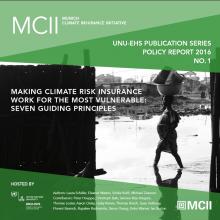Making Climate Risk Insurance Work for the Most Vulnerable: Seven Guiding Principles
The devastating impacts of climate change are already being felt around the globe, threatening sustainable development and resilience, impairing socioeconomic development and reinforcing cycles of poverty. Scientists are increasingly able to confidently attribute the increased intensity and frequency of extreme weather events – such as droughts, heatwaves, floods and cyclones – to human-induced climate change. Worldwide, the poorest people bear a disproportionate burden of climate stress, yet they have contributed least to the drivers of climate change. In the face of predicted growing weather extremes and profound shifts in natural systems, the need is greater than ever to support the most vulnerable people and countries in finding effective strategies to manage risks and unexpected shocks and to build resilience to climate impacts.This detailed policy report illustrates how well-designed climate risk insurance – when applied in conjunction with other disaster risk management measures and strategies – can protect people against climate shocks by acting as a safety net and buffer shortly after an extreme weather event. It shows how, in this way, insurance can promote opportunities by helping to lessen financial repercussions of volatility and can stimulate transformation by incentivizing risk reduction behaviour and fostering a culture of prevention-focused risk management. In addition to seven guiding pro-poor principles for delivering climate risk insurance the report also provides recommendation for implementation, including the relevant actors and their roles.The research and results feed into the G7-initiated InsuResilience Initiative, hosted by the GiZ in Bonn, Germany.
Document Tabs

